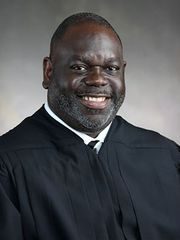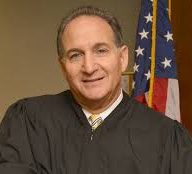
Recently I became aware of the pioneering legal decisions concerning mental health reform that began in the 1950s and 1960s continuing really through the end of his very long legal career on the federal bench of Judge Frank M Johnson of Alabama. He was a pioneer most well-known for his decisions in the field of civil rights. In the decades since his name pioneering legal decisions and forward-thinking ideas that basically led to the basis for federal interventions and sweeping of desegregation across the self especially in the 1960s. Some people still remember the difficulties in the Kennedy administration and integrating both public high schools elementary schools and perhaps most famously the state university systems in Alabama and Georgia. Many people remember Gov. George see Wallace’s famous stands on the steps the University of Alabama buildings in which he proclaimed to television in the world beyond his stance of, “Segregation now, Segregation tomorrow, Segregation forever.” Judge Johnson’s decisions in the 1950s, and for decades later throughout his long federal judicial career, virtually quashed the legal and institutional resistance in the South and correspondingly nationwide, to public school and university level segregation practices. However, I became aware a few months ago, demonstrating a hole in my grasp of psychiatric – legal histories, of the role of this jurist in the very famous initial decisions regarding mental health hospitalization and more tellingly the right to treatment. In one decision the most famous of all, Wyatt versus Stickney he went on to write the standards for the first time of the delivery of mental health care in state hospital institutions.

Note: for more information on these two pictured books, please click through to Amazon [note I do NOT receive any remunerative ‘kickbacks’ from Amazon if you purchase; these are for your educational edification only]
The Wyatt order of 1971 defined adequate care and treatment as comprised of three areas: a humane psychological and physical environment; a certain number of qualified staff; and individual attention.
One reference that is a good explication of the then newly emerging concept of the “right to treatment” by Kathryn Glass of the University of Michigan Dept. of Social Work is the following: An Examination of “Right to Treatment” Standards: Mental Health Policy within the Context of the State Hospital System by Kathryn Glass
The Wyatt standards were designed to meet what the district court called the three “fundamental conditions for adequate and effective treatment”: “(1) a humane psychological and physical environment, (2) qualified staff in numbers sufficient to administer adequate treatment and (3) individualized treatment plans.” See Wyatt v. Stickney, 334 F. Supp. 1341, 1343 (M.D. Ala. 1971)
This case began on October 23, 1970, when patients at Bryce Hospital, a state-run institution for the mentally ill in Tuscaloosa, Alabama, filed suit in the United States District Court for the Middle District of Alabama against the commissioner and deputy commissioner of the Alabama Department of Mental Health and Mental Retardation (“DMH/MR”), the members of the Alabama Mental Health Board, the governor of Alabama, and Alabama’s probate judges.1 These patients alleged that the conditions at Bryce Hospital were such that they had been deprived of their rights under the United States Constitution.2
On March 12, 1971, following a hearing on the plaintiffs’ application for preliminary injunctive relief, the district court found that patients at Bryce Hospital were being denied their “constitutional right to receive such individual treatment as will give each of them a realistic opportunity to be cured or to improve his or her mental condition.”3 Wyatt v. Stickney, 325 F. Supp. 781, 784 (M.D. Ala. 1971). The court ordered the defendants to devise and to submit to the court for approval, a plan to bring the hospital into compliance with constitutional standards of care.
Several months after the district court’s decision, the plaintiffs were given leave to amend their complaint to include allegations of constitutionally inadequate treatment at a second state-run hospital for the mentally ill, Searcy Hospital, in Mt. Vernon, Alabama, and at Partlow State School and Hospital, a state-run institution for mentally retarded persons in Partlow, Alabama.4 Following this amendment, the court’s order of March 12, 1971, was made applicable to the Searcy and Partlow facilities.
After the defendants failed to formulate “minimum medical and constitutional standards” for the operation of the three institutions, the district court, on April 13, 1972, established what would become known as the “Wyatt standards,” which set forth several specific requirements for the adequate treatment of both mentally ill and mentally retarded individuals.5 The court enjoined the defendants to implement the standards. See Wyatt v. Stickney, 344 F. Supp. 373, 378-86 (M.D. Ala. 1972) (Bryce and Searcy Hospitals); Wyatt v. Stickney, 344 F. Supp. 387, 394-407 (M.D. Ala. 1972) (Partlow State School and Hospital).6 The former Fifth Circuit affirmed the district court’s injunctions in 1974. Wyatt v. Aderholt, 503 F.2d 1305 (5th Cir. 1974). It upheld under the Due Process Clause of the Fourteenth Amendment the plaintiffs’ constitutional right to treatment and affirmed the standards that were promulgated by the district court. In 1975, the district court, with the agreement of the parties, amended its 1972 injunctions to apply the Wyatt standards to all DMH/MR facilities.7
Judge Johnson’s own cobbled together standards for minimum staffing numbers for a group of 250 patients in a state hospital [did not apply to private psychiatric hospitals] was as listed below:
Classification Number of Employees
=============================================
Unit Director 1
Psychiatrist (3 years’ residency 2
training in psychiatry)
MD (Registered physicians) 4
Nurses (RN) 12
Licensed Practical Nurses 6
Aide III 6
Aide II 16
Aide I 70
Hospital Orderly 10
Clerk-Stenographer II 3
Clerk-Typist II 3
Unit Administrator 1
Administrative Clerk 1
Psychologist (Ph.D.) (doctoral
degree from accredited
program) 1
Psychologist (M.A.) 1
Psychologist (B.S.) 2
Social Worker (MSW) 2
Social Worker (B.A.) S
Patient Activity Therapist (M.S.) 1
Patient Activity Aide 10
Mental Health Technician 10
Dental Hygienist 1
Chaplain 5
Vocational Rehabilitation Counselor 1
Mental Health Field Representative 1
Dietitian 1
Food Service Supervisor 1
Cook II 2
Cook I 3
Food Service Worker 15
Vehicle Driver 1
Housekeeper 10
Messenger 1
Maintenance Repairman 2
It is easy to realize that judge Johnson’s enumerating of the minimal staffing numbers of clinical and nonclinical employees needed to staff a treatment center of 250 patients was unbelievably revolutionary for its time. No one had ever done this before in quite such detail. judge Johnson did on his own with almost no experience or knowledge of inpatient psychiatric hospital treatment. He had a few sources to draw upon including those of Judge David Bazelon of the Federal District Court in Washington DC. Judge Bazelon had begun to also formulate standards of care in lawsuits coming out of the St. Elizabeth’s (state hospital) just preceding the filing of the Wyatt versus Stickney case.
Judge Johnson also formulated in this ground breading decision a number of general standards of care:
1. Patients have a right to privacy and dignity.
2. Patients have a right to the least restrictive conditions necessary
to achieve the purposes of commitment.
3. No person shall be deemed incompetent to manage his affairs . . .
solely by reason of his admission or commitment to the hospital.
4. Patients shall have the same rights to visitation and telephone
communications as patients at other public hospitals. …
5. Patients shall have an unrestricted right to send sealed mail. …
6. Patients have a right to be free from unnecessary or excessive
medication. .
7. Patients have a right to be free from physical restraint and isolation. …
8. Patients shall have a right not to be subjected to experimental
research. …
9. Patients have a right not to be subjected to treatment procedures
such as lobotomy, electro-convulsive treatment, adversive [more modern term would be: aversive] reinforcement
conditioning or other unusual or hazardous treatment. …
10. Patients have a right to receive prompt and adequate medical
treatment. …
11. Patients have a right to wear their own clothes and to keep and use
their own personal possessions. …
12. The hospital has an obligation to supply an adequate allowance of clothing to any patients who do not have suitable clothing of
their own. . . . Such clothing shall be considered the patient’s throughout his stay in the hospital.
13. The hospital shall make provision for the laundering of patient
clothing.
14. Patients shall have a right to regular physical exercise several
times a week.
15. Patients have a right to be outdoors at regular and frequent
intervals. . ..
16. The right to religious worship shall be accorded to each patient
who desires such opportunities. . ..
-502-
17. The institution shall provide, with adequate supervision,
suitable opportunities for the patient’s interaction with members of
the opposite sex.
These standards of care are now part of the national lexicon and taken for granted in all mental health treatment circles. They came to be incorporated by national accreditation bodies such as the joint commission for the accreditation of hospital organizations or JCAHO as it is known. Judge Johnson single-handedly changed the landscape of inpatient psychiatric treatment forever in the United States and his contributions cannot be overestimated.

More recently I’ve become aware of another jurist on a federal appeals court in the state of Mississippi, Judge Carlton Reeves. This man has continued these kinds of decisions on the mental health front in the state of Mississippi, virtually having to revisit decisions of 50 and 60 years ago by Judge Johnson and continue to require the state of Mississippi to live up to those original standards. Most recently earlier this year he had to fine-tune and bore down on the requirements to deliver adequate, good enough mental health treatment by quashing a legal maneuver by the state of Mississippi to avoid implementing these basic rules and to end up having to spend more money on the state public mental health system.
Judge Reeves currently is more known for his civil rights decisions and he is very recent decisions striking down discriminatory laws against LGBTQ persons and most especially, is striking down in the last few years and at the time of this writing, the third week of May 2019, Mississippi’s extremely strict post six week abortion ban.

Yet another judge who is even less well-known is judge Stephen Liefman of the Eleventh Judicial Circuit of Florida, mainly in the Miami-Southern Florida area. Judge Fleishman’s most unique in that he is also trained and former practicing psychiatrist. In his career as a state circuit level judge, he has been uncomfortably faced with the enormous numbers of mentally ill in the homeless and incarcerated populations in the modern United States. He has publicly estimated in years past that in his judicial area of assignment over 20, 000 people at any one time who are in the jails are mentally ill. He has begun a court-based intervention program, the Eleventh Circuit Criminal Mental Health Project. This program was begun in 2000. It now provides mental health assessments and diversion from the jail settings, treatment through community mental health centers, and a continuum of care that ranges from inpatient to community housing placements. This program has been another model for the nation trying to divert mentally ill persons away from the sinkhole of jails and prisons at all levels.
It is still disheartening to realize that since the 1950s and 1960s this country still has had to rely on brave jurists like these three examples, to compel states to provide minimum standards of care for the severely mentally ill. This does not speak well of the concept of states’ rights and has forced the continued imposition of federal mandates to ensure humane efforts in public mental health care.
